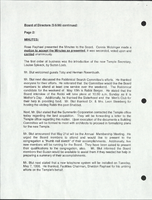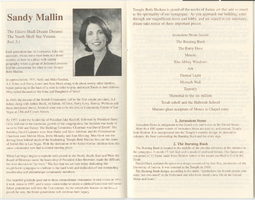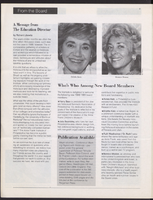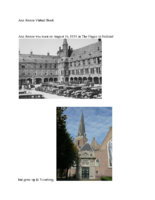Search the Special Collections and Archives Portal
Search Results

Transcript of interview with Henry Kronberg by Barbara Tabach, February 26, 2015 and April 13, 2015
Date
Archival Collection
Description
Interview with Henry Kronberg by Barbara Tabach in two sessions, February 26 and April 13, 2015. In the first session Kronberg talks about his childhood in Germany and Poland and his experience being imprisoned by the Gestapo, and transported to a concentration camp. He survived the Holocaust and met his wife, and they moved to the United States in 1946. He discusses being reunited with his sister in Las Vegas after decades of searching, and moved his family to Las Vegas in 1962. Kronberg talks about becoming involved with Jewish life here, and his wife, Lillian's involvement at Temple Beth Sholom. In the second session, Kronberg discusses purchasing Stoney's, a loan and pawn shop, including some of the clientele and merchandise. He also discusses other social and environmental concerns like anti-Semitism and water resources in Southern Nevada.
Henry Kronberg was born in 1920 and spent his early childhood in a town on the border of Poland and Germany, about 40 miles from Krakow. For years he felt uncomfortable telling his story of surviving the Nazi concentration camps of World War II. Today his name is linked to the Sperling Kronberg Mack Holocaust Resource Center in Las Vegas. And in his soft-spoken manner, Henry recalls his ordeal of loss of family and survival during this most heinous of situations through backbreaking labor and ingenuity. At the end of the war, Henry met the love of his life, Lillian, also a survivor. The two married in 1946 in Frankfurt and immigrated to New Jersey where she had relatives. He describes their difficulties and the various jobs he held until becoming an excellent baker. Then in 1962 an interesting choice took him to a bar mitzvah in Canada. While there the dinner conversation lead him to a great discovery?his sister Lala had survived and was living in Las Vegas. Soon he moved his wife and daughter to Las Vegas. His first foray into business was with his brother-in-law. However, soon it was important to be independent and to control his own destiny. He purchased a going concern, Stoney's Pawn Shop, from Dr. Alexander Coblentz, one of the city's first doctors. He became the fourth owner of Stoney's and operated it until selling it to Steven Mack in 1998. Henry and his wife were active in the Jewish community. They joined Temple Beth Sholom and became fast friends with many of the early leaders of Las Vegas and became a respected member of the secular and Jewish communities.
Text

Transcript of interview with Lovee duBoef Arum by Barbara Tabach, November 1, 2016
Date
Archival Collection
Description
Lovee Arum is the Chief Financial Officer of the Morris A. Hazan Family Foundation and Director of Hospitality for her husband Bob Arum?s boxing promotion company Top Rank. She holds a Nevada Real Estate Broker Sales License and was a partner in Western Linen (a Las Vegas linen rental and laundry company) for many years. Arum is a volunteer and philanthropist in the Las Vegas, Nevada community and works with organizations such as Temple Beth Sholom and the Nathan Adelson Hospice. In this interview, Arum reflects upon her childhood in Beverly Hills, California, and first experiencing Las Vegas after her father, Morris Hazan, established Western Linen. She discusses adjusting to Las Vegas life after moving to the city with her first husband, Larry duBoef, in 1963, and raising her daughter and son within the local Jewish community. Arum also talks about meeting her current husband, Bob Arum, and her various philanthropic activities, including Junior League, United Jewish Appeal, Keep Memory Alive and establishment of the Lou Ruvo Center for Brain Health.
Text

Transcript of interview with Arlene Blut by Barbara Tabach, May 28, 2015
Date
Archival Collection
Description
In this interview, Arlene discusses her family and important friendships; her relations with and impressions of the disparate Las Vegas Jewish communities; the meaningful ways her Jewish relationships in Duluth, Winnipeg, and Las Vegas intertwine; her theatrical, professional, and philanthropic work; the reasons she and Jerry became active Zionists; and their support for Israeli causes. Her liberal sprinkling of Yiddish terms enriches her speech as it exemplifies her deep cultural attachment to and identification with her Jewish heritage, despite the fact that her wide and diverse circle of friends remains predominantly non-Jewish.
Actor, director, friend, mother, producer, wife, and volunteer extraordinaire Arlene Piekoff (now Blut) arrived in Las Vegas in 1971 with two young children and husband, Michael Peikoff, who was opening a surgical practice. Arlene was born and raised in Duluth, Minnesota, where she attended a Conservative Jewish temple but had mostly non-Jewish friends. She met Michael at the University of Minnesota, and they married before he began medical school in Winnipeg, Manitoba, Canada. Arlene and Michael followed his residencies and fellowships to California, Michigan, and Manitoba before they came to Las Vegas Through her brother in law and Ayn Rand?s intellectual heir, Leonard Peikoff, Arlene was exposed to Ayn Rand Objectivism, a philosophy that still influences her political outlook. After her 1975 divorce she began working at the Jockey Club; founded the Meadows Playhouse, Las Vegas?s first professional black box theater; and started Renta Yenta, the valley?s first full-service event planning business. In 1980 she married tax attorney Jerry Blut in a Renta-Yenta-produced, Fiddler-on-the-Roof-themed wedding at Paul Anka's Jubilation Restaurant.
Text
Audio clip from interview with Glenn Tredwell, March 4, 2016 and April 14, 2016
Date
Archival Collection
Description
In this clip, Glenn Tredwell discusses how he came to Las Vegas, Nevada in 1975.
Sound

Minutes from Temple Beth Sholom Board of Directors meetings, 1995-1996
Date
Archival Collection
Description
Meeting minutes include reports from committees of the board, correspondence, and balance sheets.
Text

Invitation and program for Temple Beth Sholom building dedication, September 2000
Date
Archival Collection
Description
Temple Beth Sholom invitation and program for the building dedication includes a guide to the Judaic art in the synagogue and a list of past presidents.
Text

Newsletter from the Anne Frank Institute of Philadelphia, 1988, and brochure and program for Governor's Conference on the Universal Implications of the Holocaust, 1991
Date
Archival Collection
Description
Group of material about Holocaust education.
Text

Transcript of roundtable interview with members of Temple Beth Sholom by Barbara Tabach, January 14, 2015
Date
Archival Collection
Description
In this roundtable discussion, members of Temple Beth Sholom discuss the history of the long-established congregation. Interviewees are Sandy Mallin, Oscar Goodman, Jared Shafer, Joel Goot, Arne Rosencrantz, Jerry Blut, Jackie Boiman, Gene Greenberg, and Flora Mason, with Shelley Berkley joining in later in the interview. Most of the interviewees have been involved in the leadership of the congregation. They discuss relationships with various rabbis over the years, and successful fundraising efforts to build the original synagogue. Other early leaders in the congregation were Edythe Katz-Yarchever, the Goot family, Stuart Mason, Herb Kaufman and Leo Wilner. Until the 1980s, Temple Beth Sholom was the only synagogue in Las Vegas, but after a dispute over the burial of a non-Jew, a new synagogue formed (Shareii Tefilla), and at nearly the same time, Temple Beth Sholom began investigating a move from their site on Oakey Boulevard. Most have nostalgia for the former location, but discuss the changes in the neighborhood that necessitated the move to Summerlin. Then they discuss the other initiatives that were borne out of Temple Beth Sholom, such as bond drives for Israel, B'nai B'rith, and the Kolod Center. They share other memories, then discuss the leadership and Sandy Mallin becoming the first female president of the temple. They credit Mallin with keeping the temple going through lean years, and helping to recruit Rabbi Felipe Goodman. The group goes on to mention other influential members of the Jewish community including Jack Entratter and Lloyd Katz, who helped integrate Las Vegas.
Text

Biographical essay by Ann Jenner, 2014
Date
Archival Collection
Description
Jenner's essay describes her family's experience in hiding in Holland during World War II.
Text

Transcript of interview with Steven and Wendy Hart by Barbara Tabach, October 23, 2014
Date
Archival Collection
Description
Steven Hart was born on April 7, 1946, and moved to Las Vegas as a one-year-old with his parents Nat and Sylvia Hart. After graduating from Las Vegas High School, Steven Hart went through an apprenticeship program to become a journeyman carpenter as his father wanted him to learn all phases of the hotel, restaurant, gaming, and business. Including hot to build and design them. He then enlisted in the United States Navy and joined its construction battalion during the Vietnam War. Upon his return to Las Vegas, Steven followed in his father?s footsteps working in the casino industry. Nat Hart was one of the city?s original celebrity chefs and corporate vice president of food and beverage for Caesars World. Well-known for his restaurants at Caesars Palace and the Desert Inn, and for his popular gourmet cooking school. During his long career as a successful gaming executive, Steven worked at several properties, including the International Hotel as food and beverage controller. He was the vice president of food and beverage for the Del Web Corporation. The assistant corporate food and beverage director at the Argent Corporation as well as the Casino Credit executive and Junket Representative for Caesars World. He worked as executive casino host at Bills Gamblin Hall and Hotel in addition to working as the hotel gaming consultant with Hart Gaming LLC. Steve?s wife and dad also owned Kazuku Yakitori, Ichi Ban Japanese steak house, Ringside Bar and Grill and the World Boxing Hall of Champions Museum. In 1985, Steven married Texas-born Wendy Stark Hart, who is also present during this oral history interview. Wendy Hart also pursued a career as an executive in the food and beverage industry. Together, Steven and Wendy Hat reflect at length about Nat Hart?s successful career, particularly as longtime corporate vice president of food and beverage for Caesars World Inc., and opening many of the company's restaurants at Caesars Palace locally and in Atlantic City. Steve and his dad also put in many restaurants for many of the Las Vegas Strip hotels. They discuss both Nat?s relationships with infamous industry figures, like Frank Rosenthal and Hy Goldbaum, and Nat?s dining endeavors with other industry leaders such as like Kirk Kerkorian and Stu and Cliff Pearman. They also highlight the innovation and creativity that Nat brought to his work. Steven also talks about his own career path, from working small jobs at the hotels while in high school, to his military service and developing construction skills, to learning various aspects of the gaming industry management. He reminisces about his childhood in Las Vegas and involvement with Jewish community, including being the first bar mitzvah at Temple Beth Sholom and later serving as president of Jewish War Veterans, Post 711.
Text
